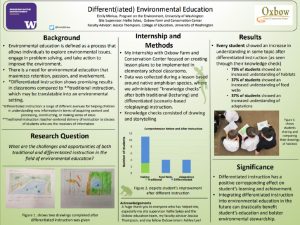Differential Instruction In The Context Of Environmental Education
Research shows that receiving environmental education during formative, childhood years is linked to an increased passion for the environment. Many different methods of instruction have proven beneficial in the field of environmental education, but recently, differential instruction has come center stage. Differential instruction is defined as a range of different avenues for helping children in understanding new information in terms of acquiring content and processing, constructing, or making sense of ideas, and has been lauded for its classroom inclusivity. The purpose of this study was to conclude what instruction method could best be used to create the most effective learning for students studying environmental topics; differential or traditional. To accomplish this task, I worked alongside the education team at Oxbow Farm and Conservation Center to create a lesson plan targeting elementary aged students. Students received both traditional and differential instruction on topics regarding native amphibian species, and knowledge checks consisting of drawing and storytelling were administered after each type of instruction to gauge interest and retention of information. Findings show an increased understanding of concepts after differential instruction versus traditional instruction. These findings are similar to those done in large scale, intensive studies showing a positive correlation between unconventional instruction methods and an increased understanding of topics. Findings from all case studies may help guide educators in redefining how to create an effective learning environment that benefits all students and ignites a passion for topics such as these.
